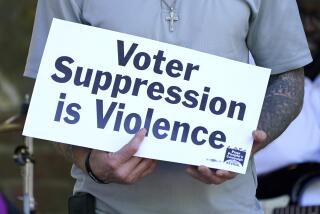Justices Revive Rape Case Against Judge
- Share via
WASHINGTON — In a partial victory for federal prosecutors, the Supreme Court overturned a controversial ruling that freed a Tennessee judge who had sexually assaulted at least five women in his chambers.
But the justices stopped short of sending the judge back to prison. Instead, they ordered a lower court to reconsider the matter.
Apparently, the justices could not agree among themselves on a clear ruling and decided to give the lower court a second chance to get it right.
There is no federal law that makes rape or sexual assault a crime. Such acts are criminal under state law, of course.
But the unique facts of this case--the perpetrator was a judge whose brother was the state prosecutor--left the victims with no choice but to turn to federal law enforcement officials.
Dyer County Judge David W. Lanier, the son of the area’s political boss, was notorious for grabbing women in the courthouse, and many of his employees complained privately that he demanded sex from them.
When an FBI investigation revealed that the portly judge had assaulted as many as nine women in his chambers, the U.S. attorney in Memphis brought criminal charges against Lanier in federal court.
But what law had he violated?
Lacking other options, federal prosecutors relied on the Ku Klux Klan Act of 1871, which made it a crime for any state official acting “under color of law” to deprive a citizen of “any right” protected by the U.S. Constitution.
It was that provision that allowed federal prosecutors in Los Angeles to bring federal charges against the four Los Angeles police officers accused of beating motorist Rodney G. King. If the police brutally beat a citizen, they can be charged with violating his rights under the 4th Amendment, which forbids “unreasonable searches and seizures.”
Although the Lanier case was simple as a matter of common decency, it was more complicated as a legal matter. When a jury convicted him of assaulting five women, a U.S. district judge in Memphis gave him a 25-year prison term and said his wanton behavior violated the women’s constitutional “right to be free of unauthorized and unlawful physical abuse” by a state official.
The U.S. appeals court in Cincinnati overturned Lanier’s conviction on a 9-6 vote on the grounds that no higher court had declared such a constitutional right. As a result, Lanier had not been given “any notice that this ambiguous criminal statute” would cover sexual assaults.
In a tentative opinion, the Supreme Court said the lower court had adopted “the wrong standard” by assuming no such right exists unless it has been specially decreed by a higher court.
“So long as prior decisions gave reasonable warning that the conduct at issue violated constitutional rights,” the offender can be charged with a crime, the court said in U.S. vs. Lanier, 95-1717.
But rather than say it was obvious that Lanier’s sexual assaults violated the women’s rights, the justices told the lower court to reexamine the matter.
More to Read
Sign up for Essential California
The most important California stories and recommendations in your inbox every morning.
You may occasionally receive promotional content from the Los Angeles Times.














